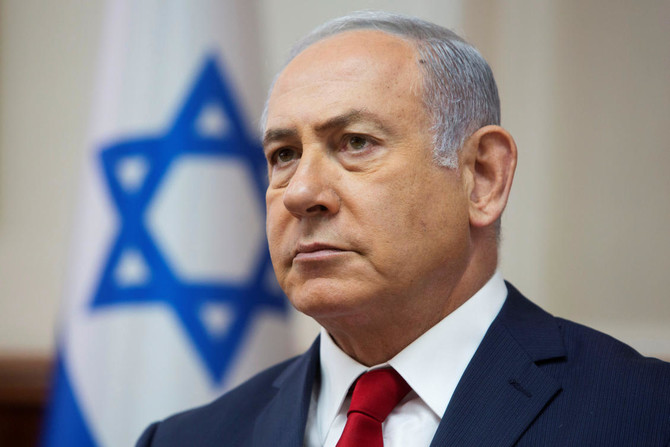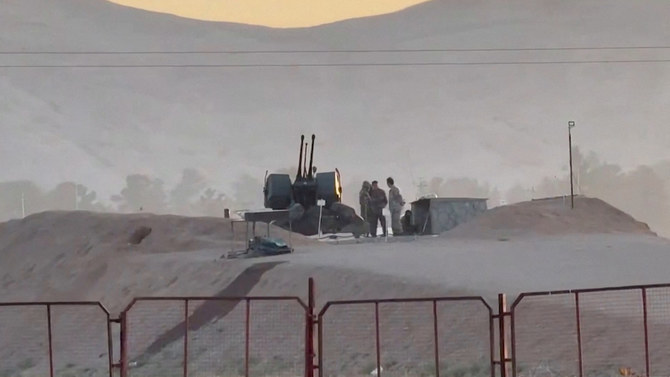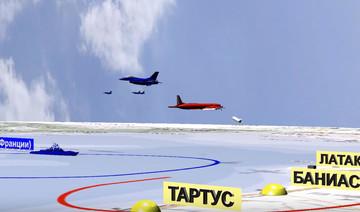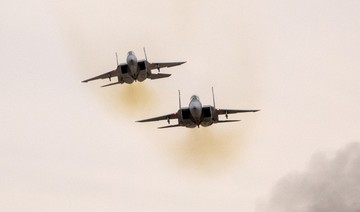JERUSALEM: Prime Minister Benjamin Netanyahu said on Tuesday Israel would continue its military operations in Syria, after Russia announced it would supply an advanced anti-aircraft system to its Syrian ally.
“We will continue to act to prevent Iranian military entrenchment in Syria and we will continue the military coordination between the IDF (Israel Defense Forces) and the Russian army,” Netanyahu told reporters before boarding a flight to New York, where he will address the UN General Assembly.
Russia said on Monday it would supply an S-300 surface-to-air missile system to Syria in two weeks despite strong Israeli objections, a week after Moscow accused Israel of indirectly causing the downing of a Russian military jet in Syria.
Russia, which fights in Syria to support the government against rebels and militants, has said Syrian anti-aircraft batteries shot its IL-20 surveillance plane down by mistake shortly after Israeli jets hit a nearby target.
Moscow accused Israel of creating dangerous conditions that caused the incident.
Israel, which has carried out air strikes in Syria many times during the civil war, said after the incident it would work to improve “deconfliction” of its missions with Russian forces, but would not halt them.
Netanyahu spoke by telephone with Russian President Vladimir Putin on Monday. In his remarks on Tuesday, Netanyahu said he had agreed with Putin “that the working teams from the IDF and the Russian army will meet soon.”
The Israeli leader made the remarks after convening his security cabinet to discuss the tensions with Moscow.
“Over the past three years, Israel has been highly successful in preventing the Iranian military entrenchment in Syria and Iranian attempts to transfer lethal weaponry to Hezbollah in Lebanon,” Netanyahu said.
But he said there had been occasions when things had not gone smoothly, calling Syria’s downing of the Russian plane “tragic.”
Israel has long lobbied Moscow not to provide the S-300 to Syria, fearing this would hinder its aerial capability to strike the forces of Iran and its Hezbollah allies in Syria.
Netanyahu: Israel will continue operations in Syria against Iran
Netanyahu: Israel will continue operations in Syria against Iran

- Russia said on Monday it would supply an S-300 surface-to-air missile system to Syria in two weeks despite strong Israeli objections
- Israel has long lobbied Moscow not to provide the S-300 to Syria
Gazans cool down in seawater despite nearby Israeli vessels

- Soaring temperatures in the embattled Palestinian enclave have prompted Gazan children to resort to the sea
RAFAH: Soaring temperatures in Gaza during the past week have driven thousands in the enclave’s southern city of Rafah to seek respite on beaches.
The proximity to Israeli military vessels did not stop hundreds of war-weary Gazans from bringing their children to enjoy a day of paddling and swimming, according to Arab News’ reporter in the embattled Palestinian enclave.
Many of the 1.4 million displaced Palestinians in Rafah live in makeshift shelters, including tents, on the beach, near the Egyptian border.
Since the Israeli onslaught on the Gaza Strip broke out on Oct. 7 last year, Gazans have been forced to resort to salty seawater for washing, bathing and even drinking due to the collapse of the water system.
Dubai carrier Emirates suspends check-in for onward connections, flydubai cancels Iran flights

- Dubai International Airport temporarily limiting the number of arriving flights for 48 hours from 12 p.m. on Friday
DUBAI: Dubai’s flagship airline Emirates is suspending check-in for all customers with onward connections through the city until 2359 GMT on Friday, three days after a record storm swept the United Arab Emirates.
Emirates, one of the world’s biggest international airlines, said customers traveling to Dubai as their final destination may check-in and travel as usual.
The suspension shows the airline and its hub, Dubai International Airport, are still struggling to clear a backlog of flights after the UAE saw its heaviest rains in the 75 years records have been kept, bringing much of the country to a standstill for two days and causing significant damage.
Dubai International airport, one of the world’s busiest, later said it was temporarily limiting the number of arriving flights for 48 hours from 12 p.m. on Friday to speed up recovery operations from rain and flooding.
Thousands of passengers have been affected by flight cancelations this week, Dubai Airports Chief Executive Paul Griffiths told local radio station Dubai Eye on Friday, after the storm flooded taxiways.
The storm, which hit neighboring Oman on Sunday, pounded the UAE on Tuesday, with 20 reported dead in Oman and one in the UAE.
Dubai’s budget carrier flydubai meanwhile canceled flights to Iran on Friday after receiving an official alert, a statement said.
“In line with the issued NOTAM (notice to air missions), our flights to Iran today have been canceled,” said the statement.
One flight which had already departed for Tehran returned to Dubai after the Iranian capital’s airport was closed, it added.
Flights were suspended across swathes of Iran as Iranian state media reported explosions in the central province of Isfahan.
Flight-tracking software showed commercial flights avoiding western Iran, including Isfahan, and skirting Tehran to the north and east.
The main road that connects the UAE’s most populous emirate Dubai with Abu Dhabi remains partially closed, while an alternative route into Dubai requires vehicles to use a road that is entirely covered in floodwater where cars and buses have been abandoned.
In the UAE’s north, including in the emirate of Sharjah, people were reportedly still trapped in their homes, while others there said there had been extensive damage to businesses.
Rains are rare in the UAE and elsewhere on the Arabian Peninsula, which is typically known for its dry desert climate where summer air temperatures can soar above 50 degrees Celsius.
The UAE’s National Center of Meteorology said on social platform X that Monday may see light rainfall by late night and forecast “a chance of light to moderate rainfall, might be heavy at times over some areas” for Tuesday, with a fall in temperatures over some coastal areas.
Iran closes air space, commercial flights diverted after apparent Israeli retaliatory strikes

- Drones shot down over Isfahan, says Iranian state media
- Israel military refuses to comment on incident
DUBAI/WASHINGTON: Israeli missiles have hit a site in Iran, ABC News reported late on Thursday, citing a US official, while Iranian state media reported an explosion in the center of the country, days after Iran launched a retaliatory drone strike on Israel.
Commercial flights began diverting their routes early Friday morning over western Iran without explanation as one semiofficial news agency in the Islamic Republic claimed there had been “explosions” heard over the city of Isfahan.
Some Emirates and Flydubai flights that were flying over Iran early on Friday made sudden sharp turns away from the airspace, according to flight paths shown on tracking website Flightradar24.
“Flights over Isfahan, Shiraz and Tehran cities have been suspended,” state media reported.
Iranian officials said its air defenses did shot down several drones but there had been “no missile attack for now” on the country.
The state-run IRNA news agency reported that Iran fired air defense batteries early Friday morning across several provinces after reports of explosions near the city of Isfahan.
Several drones “have been successfully shot down by the country’s air defense, there are no reports of a missile attack for now,” Iran’s space agency spokesman Hossein Dalirian says on X.
The Fars news agency said “three explosions” were heard near the Shekari army airbase near Isfahan.
Iran’s local media also reported that nuclear facilities in Isfahan were “completely secure” after explosions were heard near the area.
“Nuclear facilities in Isfahan province are completely secure,” Tasnim news agency reports, quoting “reliable sources.”
Israel had said it would retaliate against Iran’s weekend attack, which involved hundreds of drones and missiles in retaliation for a suspected Israeli strike on its embassy compound in Syria. Most of the Iranian drones and missiles were downed before reaching Israeli territory.
Several Iranian nuclear sites are located in Isfahan province, including Natanz, centerpiece of Iran’s uranium enrichment program. Isfahan, Isome 350 kilometers (215 miles) south of Iran’s capital, Tehran, is also home to a major air base for the Iranian military.
Meanwhile in Iraq where a number of Iranian-backed militias are based, residents in Baghdad reported hearing sounds of explosions, but the source of the noise was not immediately clear.
In Syria, a local activist group said strikes hit an army position in the south of the country Friday.
“There were strikes on a Syrian army radar position,” said Rayan Maarouf, who runs the Suwayda24 anti-government website that covers news from Sweida province in the south.
Iranian military positions in Syria had been frequently targetted by Israeli air strikes over the past years. Early this month, an Israeli strike demolished a consular building annex of the Iranian Embassy in Sydia's capital Damascus, killing 13 people, including two generals of Iran's Revolutionary Guards, triggering the Iranian missiles and drones attack on Israel on April 13.
At the United Nations Security Council on Thursday, Iran urged member nations that Israel “must be compelled to stop any further military adventurism against our interests” as the UN secretary-general warned that the Middle East was in a “moment of maximum peril.”
Israel had said it was going to retaliate against Iran’s April 13 missile and drone attack.
Analysts and observers have been raising concerns about the risks of the Israel-Gaza war spreading into the rest of the region.
Oil prices and jumped on the reports of the Israeli strike. Brent crude futures rose 2 percent to $88.86 a barrel, the dollar gained broadly, gold rose 1 percent and S&P 500 futures dropped 1 percent.
Israel’s assault on Gaza began after Palestinian Islamist group Hamas attacked Israel on Oct. 7, killing 1,200, according to Israeli tallies.
Israel’s military offensive has killed over 33,000 Palestinians in Gaza, according to the local health ministry.
Iran-backed groups have declared support for Palestinians, launching attacks from Lebanon, Yemen and Iraq.
Tehran plays down reported Israeli attacks, signals no further retaliation

- US media: United States received advance notice of Israel’s reported strike on Iran
- Countries around the world called on Friday for both sides to avert further escalation
DUBAI/JERUSALEM: Explosions echoed over an Iranian city on Friday in what sources described as an Israeli attack, but Tehran played down the incident and indicated it had no plans for retaliation — a response that appeared gauged toward averting region-wide war.
The limited scale of the attack and Iran’s muted response both appeared to signal a successful effort by diplomats who have been working round the clock to avert all-out war since an Iranian drone and missile attack on Israel last Saturday.
Iranian media and officials described a small number of explosions, which they said resulted from Iran’s air defenses hitting three drones over the city of Isfahan. Notably, they referred to the incident as an attack by “infiltrators,” rather than by Israel, obviating the need for retaliation.
An Iranian official said there were no plans to respond against Israel for the incident.
“The foreign source of the incident has not been confirmed. We have not received any external attack, and the discussion leans more toward infiltration than attack,” the official said.
Israel said nothing about the incident. It had said for days it was planning to retaliate against Iran for Saturday’s strikes, the first ever direct attack on Israel by Iran in decades of shadow war waged by proxies which has escalated throughout the Middle East through six months of battle in Gaza.
The United States received advance notice of Israel’s reported strike on Iran but did not endorse the operation or play any part in its execution, US media quoted officials as saying.
NBC and CNN, citing sources familiar with the matter and a US official, respectively, said Israel had provided Washington with pre-notification of the strike.
Various networks cited officials confirming a strike had taken place inside Iran, with CNN quoting one official as stating the target was not a nuclear facility.
The two longstanding foes had been heading toward direct confrontation since a presumed Israeli airstrike on April 1 that destroyed a building in Iran’s embassy compound in Damascus and killed several Iranian officers including a top general.
Iran’s response, with a direct attack on Israel, was unprecedented but caused no deaths and only minor damage because Israel and its allies shot down hundreds of missiles and drones.
Allies including the United States had since been pressing hard to ensure any further retaliation would be calibrated not to provoke a spiral of hostilities. The British and German foreign ministers visited Jerusalem this week, and Western countries tightened sanctions on Iran to mollify Israel.
In a sign of pressure within Israel’s hard-right government for a stronger response, Itamar Ben Gvir, the far-right national security minister tweeted a single word after Friday’s strikes: “Feeble!.”
Countries around the world called on Friday for both sides to avert further escalation.
“It is absolutely necessary that the region remains stable and that all sides restrain from further action,” EU Commission head Ursula von der Leyen said. Similar calls came from Beijing and from Arab states in the region.
In financial markets, global shares eased, oil prices surged and US bond yields fell as traders worried about the risks.
NO MENTION OF ISRAEL
Within Iran, news reports on Friday’s incident made no mention of Israel, and state television carried analysts and pundits who appeared dismissive about the scale.
An analyst told state TV that mini drones flown by “infiltrators from inside Iran” had been shot down by air defenses in Isfahan.
Shortly after midnight, “three drones were observed in the sky over Isfahan. The air defense system became active and destroyed these drones in the sky,” Iranian state TV said.
Senior army commander Siavosh Mihandoust was quoted by state TV as saying air defense systems had targeted a “suspicious object.”
Iranian President Ebrahim Raisi had warned Israel before Friday’s strike that Tehran would deliver a “severe response” to any attack on its territory.
Iran told the United Nations Security Council on Thursday that Israel “must be compelled to stop any further military adventurism against our interests” as the UN secretary-general warned that the Middle East was in a “moment of maximum peril.”
By morning, Iran had reopened airports and airspace that were shut during the strikes.
Still, there was alarm over security in Israel and elsewhere. The US Embassy in Jerusalem restricted US government employees from travel outside Jerusalem, greater Tel Aviv and Beersheba “out of an abundance of caution.”
In a statement, the embassy warned US citizens of a “continued need for caution and increased personal security awareness as security incidents often take place without warning.”
Israel’s assault on Gaza began after Hamas Islamists attacked Israel on Oct. 7, killing 1,200, according to Israeli tallies. Israel’s military offensive has killed about 34,000 Palestinians in Gaza, according to the Gazan health ministry.
Iran-backed groups have declared support for Palestinians, carrying out attacks from Lebanon, Yemen and Iraq, raising fears the Gaza conflict could grow into a wider regional war.
Hamas slams US veto of Palestinian UN membership bid

PALESTINIAN TERRITORIES: Palestinian militant group Hamas condemned on Friday the US veto that ended a long-shot Palestinian bid for full United Nations membership.
“Hamas condemns the American veto at the Security Council of the draft resolution granting Palestine full membership in the United Nations,” the Gaza Strip rulers said in a statement, which comes amid growing international concern over the toll inflicted by the war in the besieged Palestinian territory.
The veto by Israel’s main ally and military backer had been expected ahead of the vote, which took place more than six months into Israel’s offensive in Gaza, in retaliation for the deadly October 7 attack by Hamas militants.
Twelve countries voted in favor of the draft resolution, which was introduced by Algeria and “recommends to the General Assembly that the State of Palestine be admitted to membership of the United Nations.” Britain and Switzerland abstained.
















